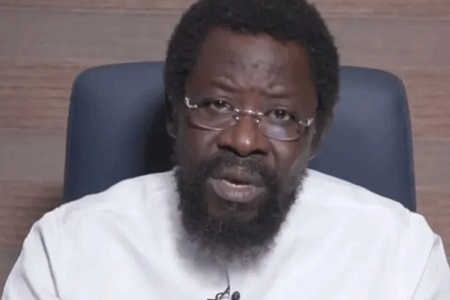Human rights lawyer and activist, Dele Farotimi, has sharply criticized President Bola Ahmed Tinubu following his recent visit to Benue State, where more than 200 residents were gruesomely murdered by armed herdsmen. Farotimi expressed dismay over the nature of the President’s address and the overall tone of the visit, which he described as politically motivated and disconnected from the grief-stricken reality facing the victims' families and the broader community.
While speaking on The Morning Brief, a current affairs program aired on Channels Television, Farotimi did not hold back his disappointment. He stated that President Tinubu’s visit to the state capital, Makurdi, appeared to prioritize optics and political staging over the serious duty of mourning and acknowledging the catastrophic loss of life.
Rather than offering a sincere and heartfelt show of solidarity with the affected communities, the President reportedly gave a speech that many, including Farotimi, interpreted as rehearsed and shallow. “It would have been better if the president had not visited at all,” Farotimi remarked, describing the entire visit as a public relations performance geared more toward political gain than healing or leadership.
According to Farotimi, the President’s address did little to reflect the gravity of the tragedy. He was particularly disturbed by what he called a lack of remorse or deep concern in Tinubu’s tone and message. He accused the administration of treating the massacre as a footnote in a grander political script designed to project power and popularity, especially with the 2027 elections already casting a shadow over national discourse.
Farotimi pointed out that the only moment of true resonance during the presidential visit came not from President Tinubu but from the traditional ruler, Tor Tiv V, His Royal Majesty James Ayatse. The monarch, he said, spoke courageously and clearly about the systemic and violent nature of the attacks. Ayatse described the killings as part of a “calculated, well-planned, full-scale genocidal invasion and land-grabbing campaign” being executed by terrorists and armed herdsmen.
This frank diagnosis, according to Farotimi, was in sharp contrast to the President’s vague and unimpressive rhetoric. He emphasized that Ayatse’s statement gave voice to the pain and fear experienced by the local people, highlighting what Farotimi considers a glaring failure on the part of the federal government to safeguard lives and maintain security.
In his scathing critique, Farotimi noted that the red-carpet welcome extended to the President in the wake of such bloodshed was not only insensitive but also symbolic of a political culture that values appearances over genuine leadership. He stressed that any responsible government must place the lives and welfare of its citizens at the core of its existence.
“There is no reason to roll out drums and red carpets when people have barely buried their loved ones. It is appalling,” he said. According to him, staging a celebration or ceremonial reception while families are in mourning reflects the deep disconnect between the ruling elite and the realities faced by ordinary Nigerians.
He lamented what he described as a growing national numbness to tragedy, stating that Nigerians have almost lost the capacity to be shocked by mass deaths. “When over 200 human beings are slaughtered and the leader of the nation arrives talking like he is on a campaign trail, it is clear that we have normalized horror,” Farotimi added.
The activist’s criticism extends beyond the President himself to the entire apparatus surrounding the visit. He believes the aides and handlers of the President are more concerned with preserving the optics of strength and popularity rather than addressing the urgent need for justice and security in troubled regions like Benue.
Calls are now mounting for a more concrete federal response to the security crisis in Benue and other states suffering from persistent attacks by armed groups. Citizens and civil society leaders alike continue to demand justice for the victims and meaningful reforms that will prevent such tragedies from recurring.
As the dust settles in Benue, the aftermath of the President’s visit remains a hot topic across media and public forums. For many, like Farotimi, it symbolizes everything that is wrong with the current leadership style, one that appears increasingly performative at a time when action, compassion, and accountability are most needed.













![Content Creator Angelica Kelechi Speaks Out on Alleged Sexual Assault at Khloe Abiri’s Spa [VIDEO]](https://blogger.googleusercontent.com/img/b/R29vZ2xl/AVvXsEgQStip4cn2DAOvQ2hNFU30OAFWoxfQIDOnStd0uVgwwxKrFAQYYvtFni6QV04OGP8dyKk5TCAhXM5es9linl1ClhjPzaazz2tTt0LmJ5lFVe5202o2McF9QROT1v2hEyNTdY-M1KRuLTY6OqqysKNfcsY5bCtwCIP8wEQ4AXcfQfTaXWWZiixqf82NDH5a/w72-h72-p-k-no-nu/abiri-khloe123.jpg)


![Bello El-Rufai Questions Discrepancy As Boko Haram Terrorist Gets 20Years While Nnamdi Kanu Receives Life Sentence [VIDEO]](https://blogger.googleusercontent.com/img/b/R29vZ2xl/AVvXsEiWSu8zIQCe1XyQUKpvkUYY03fJRFWUlJkrlvEZioStBVV0gT0uVjMg64uBqblrA0aTyaQ4RD8mhelxNq7VGPBtsNFzDl9sS880MvdKXa2d964PDDf9atDRlVMzCw2qE7vtqGj1NNyq2IVC6d3c4qqdeGP6QgwPUInkpB3rWonFU75SMJfs-ql5uH7IzchQ/w72-h72-p-k-no-nu/Bello-El-rufai1123.jpg)



0 Comments
Hey there! We love hearing from you. Feel free to share your thoughts, ask questions, or add to the conversation. Just keep it respectful, relevant, and free from spam. Let’s keep this space welcoming for everyone. Thanks for being part of the discussion! 😊